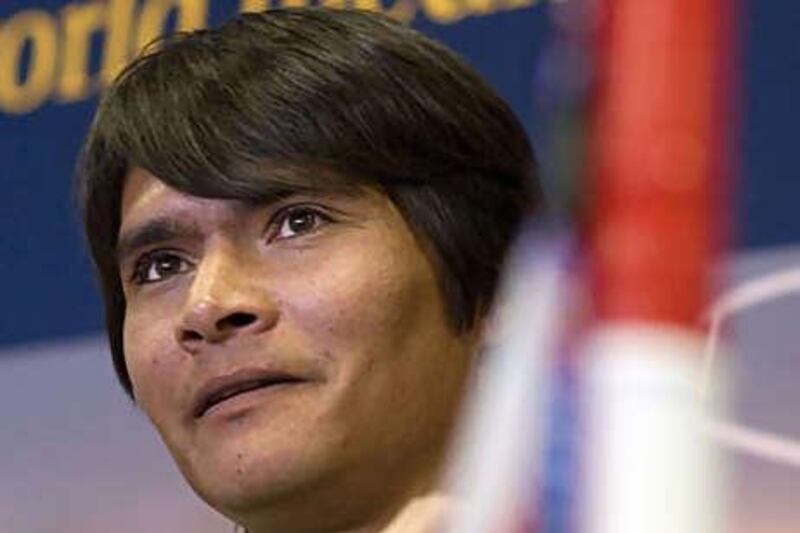CAPE TOWN // If only defender Neil van Schalkwyk had not scored an equaliser for the Santos Cape Town youth team against Battswood 15 years ago, the whole blaring brouhaha over the vuvuzela might never had come to dominate the World Cup. Amid the crowd's celebrations that day, he suddenly saw a long homemade tin trumpet being blown - and an idea was born.
"That is the moment that stuck," said Van Schalkwyk, who is credited as the inventor of the instrument that is loved by South Africans but has drawn a deluge of complaints from TV viewers around the world. Working in a plastics factory, Van Schalkwyk figured there had to be some way to produce a similar trumpet with the same deafening sound. After hours, he set off working. "I lost a lot of sleep," said Van Schalkwyk, 37. "Now, my apologies to those who are visiting that they are losing a bit of sleep," as the sound of the trumpets can be heard deep into the Cape Town nights.
By now, thousands of his vuvuzelas are sold with earplugs included. If that doesn't make much sense, little has since Van Schalkwyk started commercialising his plastic trumpets a decade ago. He began with 500 trumpets in 2001 and a year later came the breakthrough when a corporate customer bought 20,000 as a promotion. "It was, wow, this is the ultimate achievement," he said. It was only the beginning.
He could not trademark the horn itself, "because a trumpet is a trumpet and has been around for centuries," he said. So his company, Masincedane Sport, trademark-protected the name "vuvuzela", instead. He defines the term as "to sprinkle you, to shower you with noise." Now Russians are knocking on his business door, as are Brazilians, for deals to get the real "vuvuzelas" there, too. Through Urbas-Kehrberg, the German company, Van Schalkwyk already gets a percentage on European Union sales. The craze is global. There are YouTube videos about them, and in Germany they have to make clear the difference between the trumpets and Uwe Seeler, their beloved former striker, since the pronunciation is almost identical. They even showed up at Boston's Fenway Park, adding decibels to a baseball game between the Red Sox and the Arizona Diamondbacks.
Of course, far from everyone is a fan. Players have criticised the noise because they cannot take advice from the bench, and visiting fans have no chance for community singing amid the noise. Sepp Blatter, the Fifa president, has been leading the defence though, much to Van Schalkwyk's pleasure, calling it essentially African. Even Archbishop Desmond Tutu, the Nobel Peace Prize winner, has come out in defence of the deafening blare that has come to define this World Cup.
"It is amazing to see how it has transcended all levels of society," Van Schalkwyk said. In the meantime, his company is putting 100 people to work during the World Cup. And of the turnover of 7 million rand (Dh3.4m) over the past decade, half of it has come in the past year. With souvenir vuvuzelas selling for as little as Dh14, thousands of fans are expected to return home from South Africa with a couple in their bags.
In Britain, grocery store chain Sainsbury's said it had sold 43,000 vuvuzelas. In South Africa, Van Schalkwyk thinks about a quarter of the estimated two million football trumpets are certified vuvuzelas. While England's stadiums have been heaving to community singing for decades, it was always different in South Africa. "We got 11 different languages and certain songs are not understood by everyone," Van Schalkwyk said. "There is one language they do understand and it is the vuvuzela."
* AP





